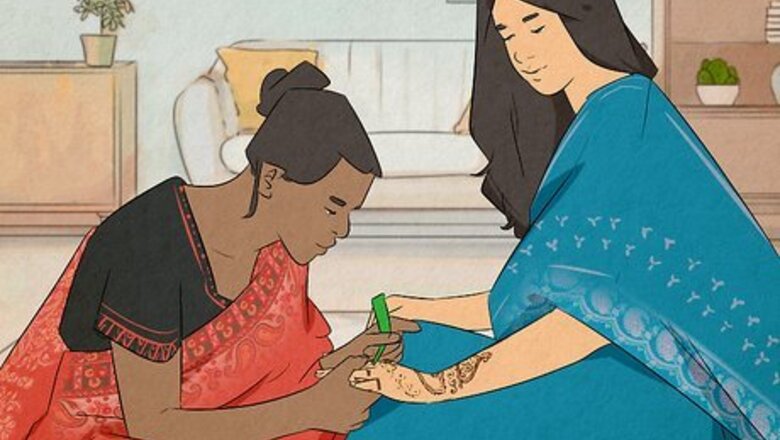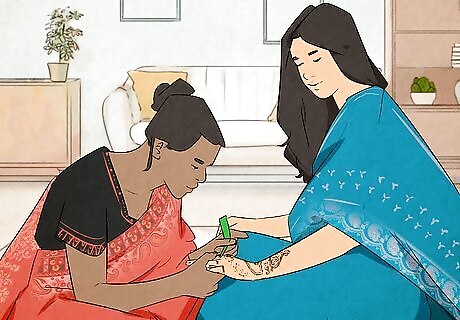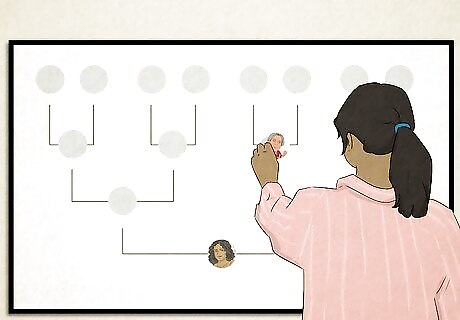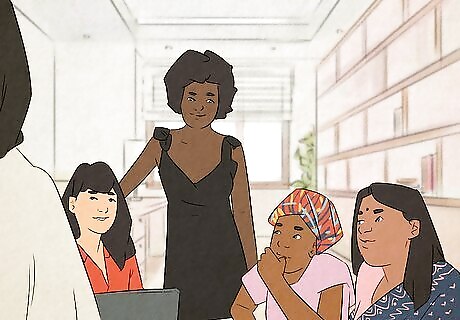
views
- Participate in cultural events and traditions or organize your own events to share your culture with others outside of it.
- Cook family recipes to get in touch with your culture through all 5 senses and enjoy a taste of home even when you're far away.
- Learn and speak your ancestral language to preserve your culture's perspective and outlook on life and the world.
- Interview elders in your community to create a cultural record of your beliefs and traditions that you can pass on to others.
Participating in Cultural Traditions

Share your culture's art and technology with others. Each culture has its own clothing, music, visual art, religious beliefs, and other characteristics that make it special. Members of your cultural community will be overjoyed to teach or talk about their hobbies, jobs, projects, and what they do for fun. While this does relate to art you might find in a museum, material culture goes far beyond that. Even a basic kitchen spoon or video game could be considered a cultural artifact. You can even learn things from less sophisticated technology. Cultures pass on tools adapted to their specific environment over generations. For example, even shaping a stone tool, as simple as it may seem, requires great skill and knowledge.

Attend or organize traditional cultural events. Your country, tribe, religious denomination, or immigrant ethnic group almost certainly celebrates major holidays or cultural festivals. Travel to these events to get a broader perspective on your culture. If you can't find any good events in your area, get some people together and organize your own.

Cook family recipes handed down through generations. It's never too late to whip up some recipes from your grandmother's cookbook! Traditional dishes play a big role in culture, with smells and tastes having powerful connections to memories. As you knead dough or try to guess the right amounts of spices, you're sure to think back to memories from your childhood or the holidays. Just reading an old recipe helps you recognize how much ingredients and kitchen tools have changed over the years. Even if you don't recognize some of the dishes, a lot of them could be your favorite comfort food or a source of family pride. Don't have family recipes? Write your own! Look for old cookbooks online or at flea markets, or write down ingredients and directions based on a dish handed down orally through generations.

Spend time with other members of your cultural community. Gather as a group not just for holidays and big events, but for ordinary meals and just conversation. Use these times to learn and keep alive the aspects of culture that are difficult to learn through books and museums, such as etiquette, body language, and humor. Compare conversations you have within your culture to those in the mainstream culture where you live. Does one feel more energetic or friendly than the other? Would a normal statement in one culture be considered rude in another? Understanding the differences in communication between different cultures helps you get to the core of your cultural experience so you can share it with others.

Learn about your culture's religious traditions. Regardless of whether you share your parents' or grandparents' religious beliefs, studying them can help you better understand their culture. Religion connects to language, history, and personal behavior. Becoming familiar with these religious beliefs and traditions helps you understand other aspects of your culture that are intertwined. Sacred texts and ceremonies can seem confusing with no one there to guide you. Find an expert willing to explain their significance or read a copy of the text with annotations.

Speak your ancestral language. If you don't know your culture's original language, ask an elder in your culture to teach it to you. When you learn the language, you gain insight into your culture's values and the way people in your culture perceive the world. Plus, if the language is rare in your area, you won't have to worry about anyone eavesdropping on your conversations! Many languages are at risk of extinction. If you know a rare or endangered language, do what you can to teach it to others. Share examples of the knowledge and perspective that would be lost if the language went away. Record the language in speech and writing or work on translations from your ancestral language to more common and widely-spoken languages so that your traditions can be preserved.
Creating a Cultural Record

Focus on a specific aspect of your culture. Record anything you've discovered through research or lived experience, no matter how small it seems. You can't write down everything there is to know about a culture—that's far too daunting! Instead, choose a smaller slice of your culture to report on. For example, you might write a personal history of your own lived experience or that of a family member. A detailed look at a specific aspect of your culture, such as cooking, jokes, myths, specific festivals, or clothing can also be an interesting project.

Choose a medium to use for your cultural record. Use calligraphy, oral storytelling, or a traditional medium to make the recording a personal cultural experience as well. Or use a digital format, such as a website or DVD, to share your cultural story with people all over the world. Explore intellectual property protection related to your medium to better protect and preserve your cultural legacy. For example, traditional fabric or clothing patterns can be copyrighted.

Conduct interviews with relatives or other members of your culture. If you're telling a specific person's history, interview them and ask them questions to draw out their stories. Feel free to let the person wander to other topics and stories as they talk to you—you might learn something you'd never think to ask about. Try to keep the interview to an hour or two, unless the person is willing to go for longer. Use a video or audio recorder (with permission from the person you're interviewing) so you're better able to capture quotes and other nuances, such as tone and body language.

Trace your family tree to discover new cultural perspectives. With the help of family members, you can go back really far into your family's history and discover whole branches of cousins and in-laws you've never met. With each new branch, you'll unlock new connections to your culture that you might never have thought about before. Ask family for scrapbooks, journals, and other documents early on. You might discover that someone else has started working on a family tree already! Government websites and physical record collections can offer additional information about family members going back centuries.

Share your record with young people to keep traditions alive. Minority cultures often struggle to pass on cultural traditions. When you share your stories and records with younger people, you help educate them on the richness of their cultural background. In the face of political struggles or social challenges, organize cultural discussions and activities to help people understand your culture's core values and keep it alive and thriving.

Accept change and adaptation when passing on cultural traditions. The dialogue around cultural preservation can sound defeatist because it talks about how cultures are "endangered" and need "preserving" before they die out. Real challenges and threats do exist, but that doesn't mean that all change is bad. In fact, culture helps people adapt to the world around them. The world has always been changing and cultures have always been adapting to that change—it's up to you to choose a direction that you can be proud of.
Sharing Your Culture

Follow, comment on, and share cultural content on social media. Chances are, there are many different social media accounts that celebrate your culture. Following those accounts and sharing posts allows you to express your love for your culture and pass it along to others. Social media allows you to connect with people from all over the world. This is especially helpful if you've moved to a different country or are studying abroad because you can connect with people from your home country. Don't forget to make your own content as well! For example, if you play a traditional instrument, you could upload videos of yourself playing both pop and traditional music.

Give presentations on your culture at schools or libraries. Teachers are often looking for ways to teach their students about different cultures—just call some schools and ask! Talking to young people is a great way to share your culture with others and preserve it for future generations. If you've moved to a country where your culture is a minority, it's also likely you'll encounter people who have the same ancestral background as you but don't know a lot about their cultural traditions. Interacting with others, whether they share your culture or not, is a great way to keep your culture alive and relevant in society.

Volunteer as a translator if you speak your ancestral language. Your skills as a translator are really valuable—especially if you speak an uncommon or endangered language. You can also help researchers understand more about your cultural traditions by translating documents or recordings in your ancestral language into a more common language, such as English. If there are members of your cultural community who live near you, you might volunteer to help them by translating documents they need to read or fill out. Reach out to your local community center or library to find out how to get started.

Start or join a foreign exchange or diversity club if you're a student. Larger schools tend to have a lot of clubs focused on cultural identity. These clubs build a cultural community among their members while also hosting events and celebrations that honor cultural traditions. If your school doesn't have one for your culture, try to get one started! Talk to someone in the student organization that oversees clubs to see what your school's requirements are to have a club recognized. Then, post fliers or talk to someone at the school newspaper to help get the word out. If there's a broader club that you might fit into, join that and represent your culture within it. For example, if your school has a Latinx club, you might join that to help raise awareness for your Aztec roots.













Comments
0 comment